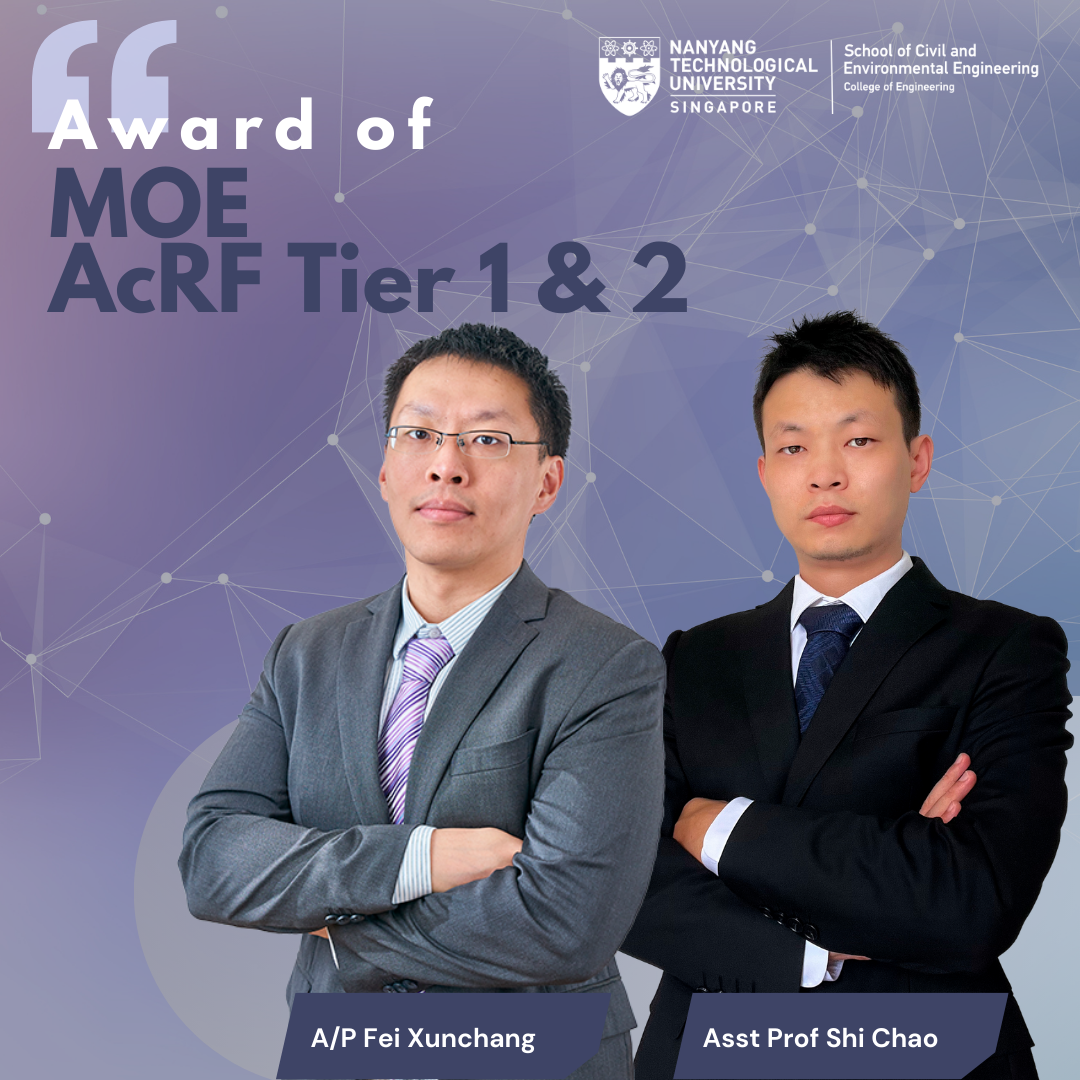Award of MOE AcRF Tier 1 & 2 - Associate Professor Fei Xunchang & Assistant Professor Shi Chao
Congratulation to Associate Professor Fei Xunchang and Assistant Professor Shi Chao on the award of MOE AcRF Tier 1 & 2 for their projects respectively.

About Ministry of Education (MOE) Academic Research Fund (AcRF)
The AcRF supports research in the Autonomous Universities that has academic significance and a good potential for creating new knowledge that will benefit the larger academic community. The research outcomes should advance high-quality research of international excellence that challenges current understanding or provides pathways to new frontiers. It supports research that serves as a foundation for discoveries that have or will have direct impact on the economy and society. AcRF contributes towards MOE’s mission of training postgraduate research manpower to support the national R&D activities by funding research scholarships.
Associate Professor Fei Xunchang's project: Synergistic thermal treatment of incineration fly ash, waste glass, and waste ceramic for value-added reuse is awarded MOE AcRF Tier 1 (Call 2/2024).
Project Write-up
This proposal focuses on developing sustainable glass-ceramic materials using incineration fly ash (IFA), waste glass, and ceramic powders, addressing waste management and recycling challenges in Singapore. The research is guided by the hypothesis that these waste materials can be transformed into valuable glass-ceramics suitable for non-structural applications, encapsulating hazardous substances and preventing environmental contamination. Aligned with circular economy principles, this approach supports Singapore’s sustainability goals.
The study is structured around three specific aims: 1) investigate the impacts of vitrification parameters and pretreatment methods; 2) develop an explainable machine learning (EML) model to optimize vitrification process; and 3) evaluate the environmental and economic impacts of waste vitrification. We firstly hypothesize that the combination of waste can exhibit synergy during vitrification, improving pollutant immobilization and enhancing the mechanical and environmental properties of glass-ceramic products. To address that, our approach involves systematic experiments to analyze key parameters and their effects on the glass-ceramic properties. We further hypothesize that EML is capable of elucidating such complex interactions and optimizing the vitrification parameters and pretreatment methods. Given that, the experimental data, combined with comprehensive literature data, will feed into an EML model to establish correlations between input parameters and output properties, ensuring both environmental and economic feasibility. Life Cycle Assessment (LCA) and Cost-Benefit Analysis (CBA) will further evaluate the sustainability and viability of this approach.
By innovating recycling processes and creating marketable products, this research aligns with Singapore's national goals for waste reduction and resource sustainability, particularly given the country's low recycling rates for IFA, glass, and ceramics. The project is academically significant, contributing to waste management literature and offering practical solutions for using waste to treat waste, enhancing Singapore’s resilience against resource limitations, and advancing sustainable urban development.
Assistant Professor Shi Chao's project: Hybrid Seawater-driven Geothermal Energy Piles for Thermal Storage and Sustainable District Cooling in Southeast Asia is awarded MOE AcRF Tier 2 (Feb 2024).
Project Write-up
Energy pile technology shows great potential for extracting geothermal energy from the ground to support sustainable space heating and cooling. This project proposes a seawater-driven energy pile system to prevent thermal imbalances and promote decarbonization in the energy sector. The system can effectively harness both seawater energy and shallow geothermal energy for sustainable space cooling while also providing flexible energy storage in the ground to meet thermal needs across different time scales.
The outcomes of this project will enhance our fundamental understanding of the complex thermodynamics and thermomechanical interactions of energy piles. This, in turn, will promote the application of energy geostructures in Southeast Asia, contributing to the region’s transition towards carbon neutrality, and benefiting mankind.














/enri-thumbnails/careeropportunities1f0caf1c-a12d-479c-be7c-3c04e085c617.tmb-mega-menu.jpg?Culture=en&sfvrsn=d7261e3b_1)

/cradle-thumbnails/research-capabilities1516d0ba63aa44f0b4ee77a8c05263b2.tmb-mega-menu.jpg?Culture=en&sfvrsn=1bc94f8_1)






